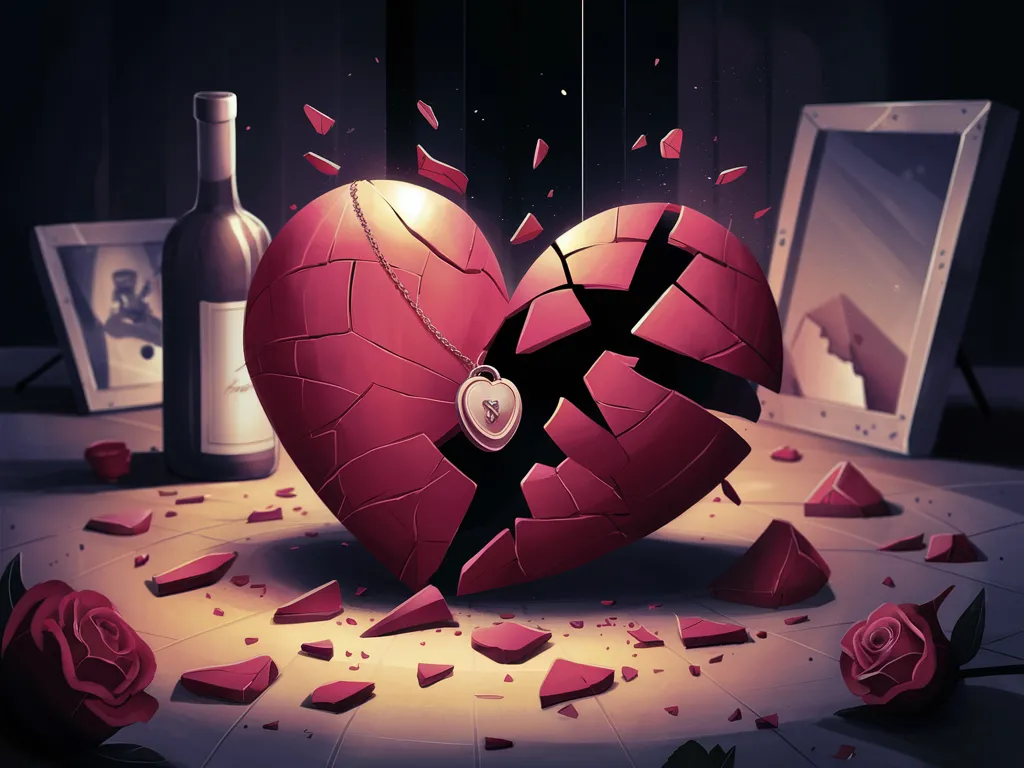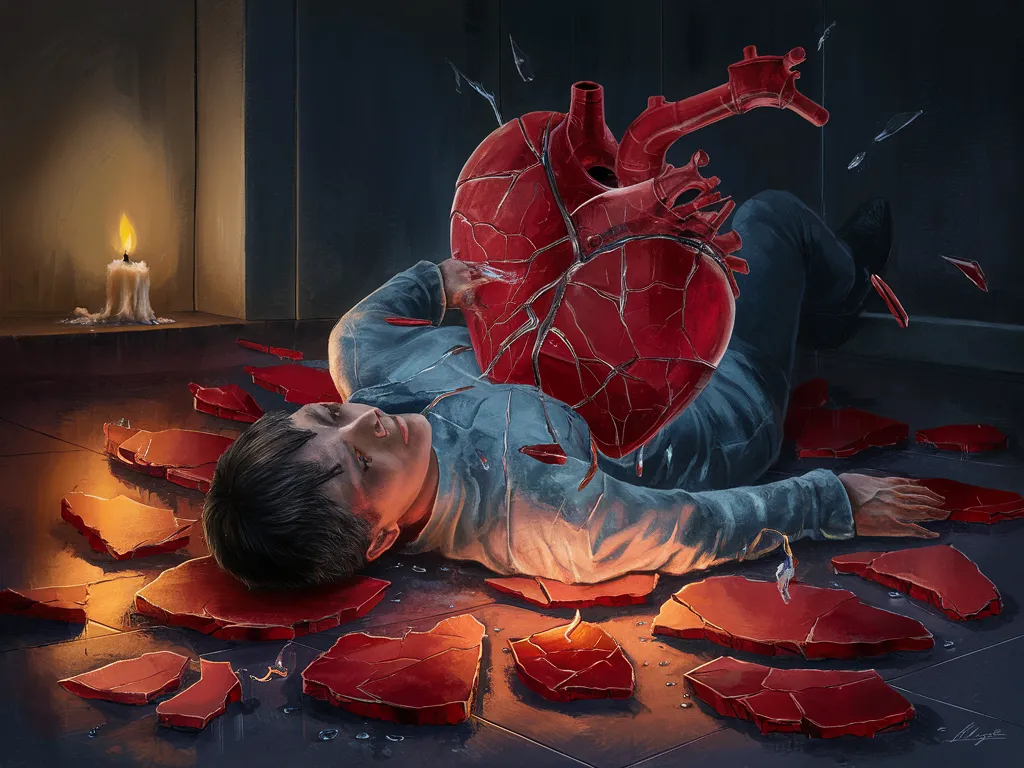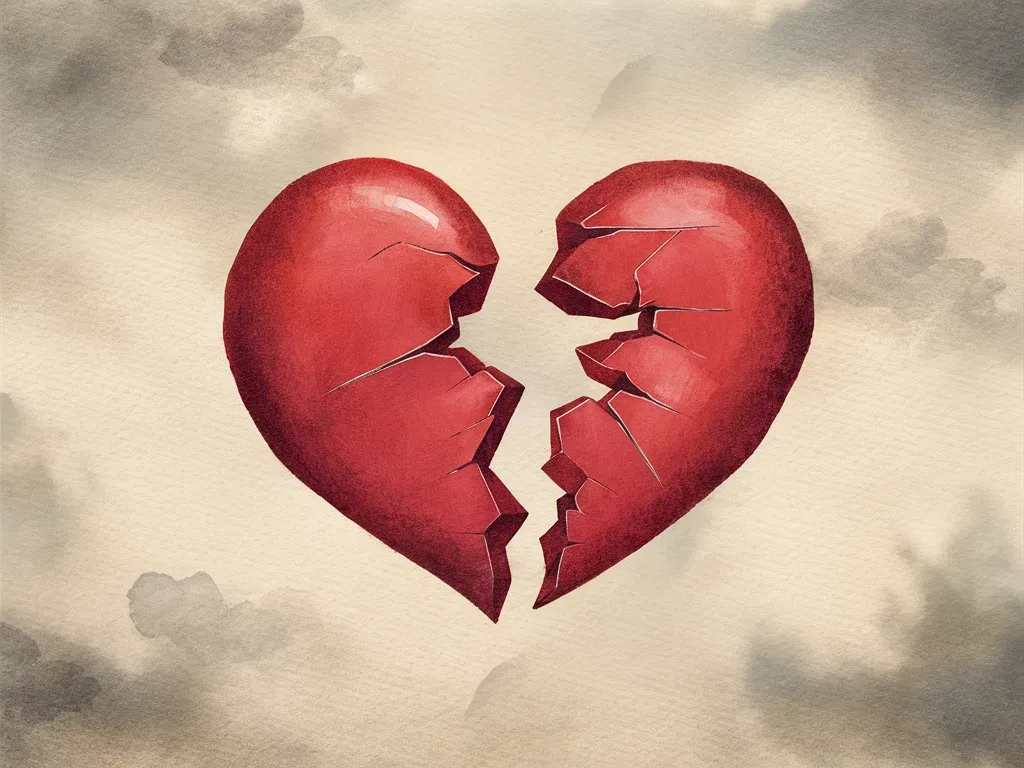Share This Article
When the person you care about so much tells you that love is over, it feels like the ground is crumbling under your feet. Those three words you never wanted to hear, “It’s over,” come like an unexpected hammer blow. Tears inevitably flow, and your days seem to be filled with an endless fog of sadness and anger at everything around you.
The people around you try to comfort you with the words: ‘It will be okay soon’, but for you there seems to be no end to the pain. Time seems to stand still, and it seems like the wounds of your heart will never heal. You are now in the throes of what we call heartbreak.
What is a broken heart?

A broken heart is the name for a whirlwind of intense emotions and physical pain that arise from the loss of someone you care deeply about. Unfortunately, this is an experience that almost everyone encounters in life, albeit with varying frequency. Heartbreak occurs after the loss of various things in life, such as a loved one, a friendship or a job. But the most common is after a broken relationship . For example, you may be dumped for someone else and left with a feeling of loneliness and heartache – a broken heart.
The concept of a broken heart is actually a metaphor; your heart doesn’t literally break, but the pain you feel can certainly be physical. That’s why we call it heartache. What exactly you go through when you’re heartbroken varies from person to person, but one thing is for sure: it comes with an immense amount of stress, especially if the loss is sudden and unexpected. This stress affects both your emotional and physical well-being.
The history of the broken heart
While it may seem like heartbreak is a thing of the modern age, the concept actually goes back many centuries in human history. In fact, the very first mention of heartbreak dates back more than 3,000 years. Biblical references to the pain of a broken heart can be traced back to the year 1015 BC. Even in ancient texts we find references to the pain of a broken heart. As the psalmist once wrote in Psalm 69:20 :
“Insults have broken my heart and weakened me, I looked for sympathy but found none; no one was there to comfort me.”
Over the years, the concept of heartbreak has inspired countless plays and musical numbers. Take for example Shakespeare’s masterpiece, ‘Antony and Cleopatra’, in which the character Enobarbus dies due to a broken heart. Another work by the famous English poet and writer, ‘Romeo and Juliet’, also features the tragic death of Lady Montague due to the consequences of a broken heart. It shows that the impact of a broken heart is timeless and has touched and inspired people for centuries.
The consequences and symptoms
If the person you still have feelings for leaves you, it can be a hard blow. The feeling of being left behind by a loved one, as well as being judged as unworthy as a partner, can have profound effects on both your personality and your physical health.
Also read: My Journey to Recovery: How I Ultimately Overcame Burnout
A broken heart can lead to depression, physical complaints, anxiety, feelings of helplessness and even negatively impact your performance at work and in sports. The symptoms of a broken heart are not an exception, but rather a normal part of the process. Everyone experiences it at some point in life, albeit to varying degrees.
The duration of this emotional roller coaster depends on what exactly happened and how strong your desire is. It can last from just a week to several months, and in the most severe cases, even many years. These are some things you may experience when you are heartbroken:
- You may have unexpected crying fits that you can’t control.
- Sleeping becomes a challenge, and sometimes it doesn’t work at all.
- You may feel a painful pressure on your chest.
- Oblivion seems to be a constant companion.
- Your appetite disappears like snow in the sun.
- Concentrating seems like an impossible task.
- Feelings of fear can overwhelm you.
- You have trouble focusing.
- Dizziness may occasionally crop up.
- You often blame yourself for what happened.
- Thoughts of that one person keep haunting you.
- You feel physically ill.
- Sometimes you may even experience panic attacks.
Does this sound familiar to you? If so, chances are your heart is broken. The signs of a broken heart manifest themselves both physically and mentally and can leave you in a state of confusion. Recognizing that you are dealing with a broken heart is the first step to recovery and healing.
Also read: What is Monogamy? How it Works, Benefits and the Limits
Why does it hurt so much?

You may wonder why the pain of a broken heart can be so intense. Research has shown that your brain registers the emotional pain of a broken heart the same way it registers physical pain. This explains why you can sometimes actually experience the pain as physical. It’s a feeling like your heart is being ripped out of your chest, which is exactly why people often say it’s “heartbreaking.”
Have you ever wondered if heartbreak can physically break your heart? Well, not quite. But heartbreak can leave such deep marks that it can physically damage your heart. While your heart can’t literally break in two, it can still be damaged. This is known as Takotsubo Cardiomyopathy , also called ‘broken heart syndrome‘ as it is often associated with the loss of a loved one.
The intense emotional rollercoaster and extreme mental stress you experience are not conducive to your heart health. This acute emotional stress can lead to temporary paralysis of part of the heart muscle . This can result in physical symptoms such as shortness of breath, chest pain, palpitations and cardiac arrhythmias. It is not only mentally taxing, but also physically painful.
These symptoms can be very similar to those of a heart attack, but unlike a heart attack, broken heart syndrome usually does not cause permanent damage to the heart. Fortunately, in most cases the symptoms disappear on their own within a few weeks.
It’s not you, it’s your hormones
It’s tempting to blame yourself when you’re heartbroken. But the truth is, it’s not you, it’s your hormones. And no, hormones are not just the domain of teenagers and pregnant women. Every day your body produces a range of hormones that are involved in different processes.
What you feel when you’re heartbroken is actually the result of a complex series of biochemical processes in your brain. These processes are initiated by hormones, especially when you are in love. They cause changes in your body, often resulting in that familiar feeling of euphoria. These hormones can even make love addictive, especially when you become emotionally attached to someone. Some of these hormones also play a role when you are heartbroken.
Dopamine and oxytocin are mainly responsible for that wonderful feeling of being in love and also make you want to repeat certain behavior. You can probably imagine what happens when these feelings disappear, such as when a relationship ends.
Cortisol: the stress hormone
This is where cortisol comes in, also known as the stress hormone. When levels of the aforementioned love hormones drop rapidly, cortisol takes their place. Cortisol is not a cause of stress, but rather a hormone that helps you deal with stress better. However, it has a downside as it can affect your immune system.
When cortisol is present in large amounts and circulates in your body for too long, the symptoms mentioned previously can occur, such as anxiety, forgetfulness, negative mood and sleep problems. In other words, cortisol alone can lead to a host of unpleasant mental and physical symptoms that come with heartbreak.
Mend from a broken heart
The recovery from a broken heart has many similarities with the process of grieving, in which someone tries to regain peace after a major loss. When you’re dealing with heartbreak, you often go through the same five stages as described by Kübler-Ross. It is important to remember that everyone goes through these stages in their own way. Some can skip phases, others linger longer in one phase, and sometimes you go through an earlier phase again. These are the five stages you typically go through when recovering from a broken heart:
Denial
“This is not the end, he/she will probably come back.”
In the denial phase it is often difficult to accept that love has come to an end. You try to avoid reality as a kind of self-protection.
Fury
“Why is this happening to me now?”
Over time, it dawns on you that the loss is real. The pain of loss can manifest itself in anger, crying fits, screaming or cursing.
Negotiate
“Maybe if I behave differently we can work it out.”
During this phase you can negotiate with yourself. For example, you can make promises or change your behavior in an attempt to fix the situation.
Depression
“I will be alone forever.”
When nothing seems to help cope with the loss, feelings of regret, fear and sadness can emerge. You can feel powerless and cut off from the world, sometimes even spending days on the couch.
Acceptance
“What happened, happened.”
After taking time to grieve the loss of a loved one, you eventually begin to accept reality. This is the moment of letting go; you leave the past behind you. You realize that it is really over and start making plans for the future again. You have given it a place and move on with your life.
7 tips to heal your broken heart

When your heart is broken, it seems like the world is ending. It feels like a deep hole has been punched in your chest, with a wound that just won’t heal. You try everything to avoid the thoughts, cry yourself to sleep and devour every Netflix series that comes along. But no matter what you do, nothing seems to help you feel ‘normal’ again. A broken heart is perhaps the worst pain you can experience. You would probably rather get punched in the face than go through this grief again.
1. Break the cycle
When you lose something that is incredibly valuable to you, it is natural to feel sad. Those feelings and emotions are part of the healing process of a broken heart. But reliving painful memories over and over again keeps you trapped in a vicious circle that must be broken. Without realizing it, you are programming yourself to feel sad every time those thoughts arise.
To break this cycle, it is essential to change your habits. Do something different than what you normally do. Turn off the music if it reminds you of the other person and put something else on the empty chair across from you. Move the furniture in your home, paint the walls a new color, or take up a new hobby. Changes in your life help you break free from old associations so you can start with a clean slate.
2. Change your way of thinking
You may be able to change everything around you, but the pain is inside. That is why it is important to also make changes internally. Change the way you think so that you place less value on the situation you are in. When you think you are the only one going through these intense emotions, the burden becomes heavier. But when you realize that hundreds of thousands of people are going through the same thing at the same time, it gives you some reassurance.
The way you see the world is based on your personal beliefs, feelings and internal habits. You can adjust this thinking framework. For example, it is not the end of your happiness, but the beginning of a new chapter in your life. When you’re heartbroken, you can be focused on what happened, but there are so many other aspects of life.
Also read: 18 Reasons to End Your Relationship (and Dump Your Partner)
3. Rediscover yourself
When you have been with someone for a long time, the boundaries between you and your partner become blurred. Your identity becomes inextricably linked to that of your partner. So when the relationship ends, you can lose yourself and even forget who you are. It’s normal to feel lost.
To say goodbye to the person you were during the relationship, it is important to develop a new version of yourself. Try new things, meet new people , and discover your own life through new experiences, this time alone.
4. Start a rebound
If you’ve been rejected or dumped, it can help to start a new “relationship” fairly quickly, also known as a rebound. Research shows that jumping into a new relationship can be a healthy and even long-lasting way to recover from a breakup. People who start a rebound relationship are more confident in their attractiveness to others and get over their ex-partner more quickly.
The faster you do this, the more self-respect you retain, the less you suffer from fear of commitment , and the less you avoid new relationships.
The results of the study suggest that starting a new relationship as early as possible after a breakup can help with a faster recovery. In any case, there are plenty of singles who want to meet you. In the Netherlands these are a number of places where you can go:
5. Find moments of joy
In times of hopelessness, it seems like the sky will never be blue again. Everything seems gray and gloomy, and nothing seems to make you happy anymore . This is the time to open up again to the beautiful things in life, so that your heart can heal. Look for moments of joy to experience a feeling of happiness again. Normally you don’t have to actively seek out these moments, but with a broken heart you’ve forgotten what they feel like. These moments can be:
- Spending time with your nieces and nephews
- Eating together with your best friends
- Pamper yourself with a day in the sauna or a massage
- Walking in nature or along the beach
- A holiday to a paradise island
Moments like this remind you that the “good” life still exists and is worth living. These are the moments you have to experience to become happy with yourself and your life again.
6. Follow your passion
Whether you enjoy singing, dancing, drawing, gaming, or doing something creative, use your passions to recover from heartbreak. Distraction can help, and even more so if you have a passion that you can completely immerse yourself in. Writing, in particular, can help you cope with a broken heart. For years, therapists have used questionnaires, diaries, and other writing methods to help people cope with stress and trauma.
Writing down your feelings and thoughts is a tested and effective way to process difficult experiences, such as the loss of a loved one. Whether it’s in the form of music or in a diary, it doesn’t matter; If you can express yourself and therefore better understand what is going on inside you, it will help you recover faster .
7. Exercise
What is exercise not good for? It not only reduces the risk of all kinds of conditions, but can also help with a broken heart. During stressful events, such as the unexpected loss of a loved one, you may experience symptoms that are difficult to control. Sleep problems, reduced concentration and mood swings are typical symptoms of depression. Exercise can act as a buffer to reduce these symptoms so you can recover faster.
If you are suffering from a broken heart, now you know what it means, where it comes from and what the symptoms are. The feeling of emptiness may seem endless, but in most cases it disappears with time. It is possible to heal and become happy with yourself and your life again.
P.S. Are you already following Gistinger.com on Facebook , Instagram and Twitter?


